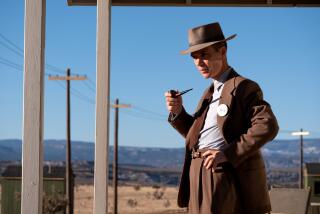Cannes: With ‘The Congress,’ Ari Folman votes for new audacity
CANNES, France -- Few independent directors have won as many plaudits for their visual inventiveness as Ari Folman. Five years ago, the Israeli first-timer came to Cannes and caught the film world’s attention with his combat piece “Waltz With Bashir.” A largely autobiographical account of his experience in the first Israel-Lebanon war, “Bashir” subsumed real-life acting into a palette of painstaking hand-drawn animation. The film went on to be nominated for the foreign-language Oscar and win the Golden Globe in the category.
The filmmaker returned to the Croisette this week with his first film since “Bashir,” a Director’s Fortnight selection called “The Congress.” The movie, in English, is one of the more audacious works to play on these shores in a while, not only because it blends animation and live action but also because it tackles subjects as far-flung as Big Brother, immortality and the viability of Hollywood actors in a CG world.
For starters.
CHEAT SHEET: Cannes Film Festival 2013
And though “The Congress,” which is based on a Stanislaw Lem novel, moves far away from the geopolitics of “Bashir,” it continues to push the limits of visual storytelling, particularly through the hyper-saturated, hand-drawn colors that describe its world of the future.
“It’s a beautiful form, and it’s dying, and I want to keep it alive,” Folman said of his noncomputerized style as he looked out a hotel window Saturday while rain deluged the Croisette. “But I wanted to stay as far away from the Middle East as I could. Not because I wanted to escape politics, but because I wanted to escape myself. And there’s no better escapism than science fiction.”
To call the movie sci-fi would be accurate. But it wouldn’t tell the whole story.
The film begins with Robin Wright, playing a version of herself named Robin Wright, facing a stark choice from her agent (Harvey Keitel). She’s approaching her mid-40s, and top roles aren’t coming her way anymore. So an oily studio executive has a proposal: He wants to record all of Wright’s expressions and use them in digitally manipulated roles, in everything from romantic comedies to pulp thrillers. If Wright signs on, she’ll be given a lot of money and basically be turned into a movie star in perpetuity.
There’s only one catch: She’ll never be allowed to act again.
After some hand-wringing, the Wright character (also a single mother of two children, including one who’s slowly going deaf) decides to take the offer. It’s there that the movie, a fantastical but comparatively straightforward story, takes some wild leaps. Skipping ahead 20 years into the future, the action then goes animated as we see the results of this new Hollywood-centric digital world, in which the lines between fantasy and reality have become hopelessly blurred.
I wouldn’t want to spoil what happens in this world -- though given how complicated it gets, I’m not sure I could -- but the movie basically takes on a “1984” direction with plot turns involving Big Brother, jack-booted thugs and a people’s revolution. Then it jumps further into the future to offer ideas about death and reconstituted souls in an alternative universe that Wright, now an octogenarian, may or may not want to inhabit.
And did I mention that Paul Giamatti plays a human doctor? And Jon Hamm a digital avatar who falls for Wright? (Hamm is animated, but Folman shot all the animated scenes with real actors and then re-created them as drawings.)
When all is said and done, the movie aims everywhere, not least of all at Hollywood.
There are many pokes at the studio and star system (the company that takes over the world is dubbed “Miramount” and its headquarters is designed to look like the Paramount lot. The movie is also peppered with quick-cut Hollywood jokes -- drawings that mock Tom Cruise’s perma-smile, for instance.
At a post-screening Q&A session, Folman playfully avoided a question about the legality of those scenes. “Do you know of a real company called Miramount? I created the company. It’s mine,” he smiled slyly to a questioner. “Did you see Tom Cruise in the film? I didn’t see him.”
Since it premiered two days ago, “The Congress” has already become something of a talking point at Cannes, though the nature of those points can vary. Some tastemakers have been lauding it, others have been saying they didn’t get it, and still others have been flat out frustrated by it. Two critics of similar age and temperaments I ran into had polar reactions. “There was something interesting there. Wish he knew what it was,” said one. “It’s the most beautiful and idea-driven film I’ve seen in a long time,” said the other. “It reminded me of ‘Cloud Atlas.’ ”
Similarities to art-house films old and new abound. “Metropolis” is in there. So is “Synecdoche, New York” and “Children of Men.” Even its harshest critics admit the film is wholly uncategorizable. Is it a comment on a society’s increasingly tenuous grip on reality? A Hollywood satire? An optimistic look at immortality?
Folman himself says he thinks it could be viewed many ways. “My sister walked out of the screening and said, ‘How could you kill [a main character]?’ ” And I said, ‘What makes you think [that character] is dead?’ ” It’s that kind of movie.
Whatever you think of it, the film does what Cannes is in one important sense designed to do: show the kind of moviemaking adventurousness present in places far removed from Hollywood (although irony-watchers will note that, in this case, the inventiveness is actually set in Hollywood).
What becomes of the film in the wider world remains to be seen. Certainly, cult status seems a possibility, though there’s also a chance at something more. (The director is not totally adept at concealing his disappointment at the commercial reaction, noting acidly that “almost every distributor around the world who was with me for ‘Bashir’ left me for this one,” though he seemed to hint that there was a possibility “Bashir’s” U.S. distributor, Sony Pictures Classics, could make a play for it.)
Despite the divided commercial reaction and the fact that the film wasn’t -- disappointingly to Folman -- accepted in the main competition section, the director said he had no regrets about the movie he made.
“When I first came to L.A. to raise money for this film, people kept saying I was crazy.” (The budget was eventually gathered with cash from investors and national film funds in half a dozen European countries; it took several years of flesh-pressing to get off the ground.) “The people in L.A. kept saying to me, ‘Anyone can do a movie with Robin Wright and Harvey Keitel. Why don’t you do another film like ‘Waltz?’
“And that’s the thing, man. If you’re an Israeli filmmaker you’re supposed to stay there and make a movie, and if it’s about the occupation or the Holocaust, even better. And if you’re Palestinian, you’re supposed to make a tragic movie in Gaza. And if you’re Chilean, you stay in Chile. And really, why should that be? Only in America are people allowed to make a movie about other places.”
ALSO:
Cannes 2013: For ‘Blue Ruin’ helmer, a new path to career-building
Cannes 2013: Emma Watson says ‘Bling Ring’ ‘wasn’t about stealing’
Cannes 2013: ‘Salinger,’ Osage County’ among Weinstein hopefuls
Follow me on Twitter at https://twitter.com/ZeitchikLAT
More to Read
Only good movies
Get the Indie Focus newsletter, Mark Olsen's weekly guide to the world of cinema.
You may occasionally receive promotional content from the Los Angeles Times.







